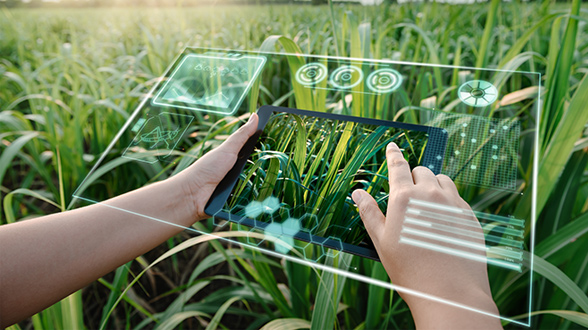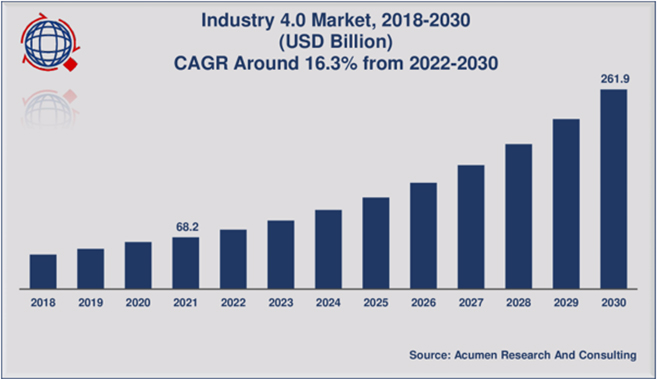Human civilisation has always had an important connection with the environment. The LiFE initiative (Lifestyle for the Environment) captures this very important aspect. Global environmental concerns such as climate change, pollution, environmental degradation, and resource depletion pose challenges to humanity as never witnessed before. As per estimates, in the absence of requisite action, approximately three billion people globally—which is approximately 45 percent of the total population of the planet—could experience irreversible adverse consequences such as chronic water scarcity and the loss of approximately 18 percent of GDP by 2050. However, when one deliberates on issues of new energy resources, climate security, sustainability, and circular economy, the impact that the rise of Industry 4.0 has in store is hard to ignore.
The idea that individual changes in attitude and perception would build a bigger social movement based on a conscientious pledge towards environmental safety is, indeed, an innovative and remarkable vision for the future. Any institutional edifice also requires a grassroots connection without completely neglecting global concerns. The transition from the Millennium Development Goals (MDGs) to the Sustainable Development Goals (SDGs) focusing on Agenda 2030 is known to all. SDGs, as global goals, now need the right collaboration between all stakeholders keeping the masses in central focus. Traditional and emerging technology can be an enabling factor to achieve the SDGs and a win-win situation for all stakeholders. Amidst the stride between individual quests and collective solidarity, the rise of Industry 4.0 and associated technologies such as Artificial Intelligence (AI), big data analytics, cyber physical systems, and block chain can be used to build the right synergies. In contemporary times, from irrigation and water transport to solar energy, the impact of technology-oriented new solutions for ushering environmentally doable problem-solving approaches demands serious attention.
The global governance realm is witnessing a strange churning. When one reflects on history, globalisation as a process of trade and exchange of goods, and services has been significant. It has been a highly contested area where advantages co-existed with disadvantages. The rise of global markets and international firms has to be read along with the loss of the grassroots connection; the increasing inequality of development, opportunities and resources; and ecological imbalances, amongst others. In a similar vein, one may criticise globalisation but calling for a complete rollback of it is not viable.
The call for the retreat of globalisation came in the context of the downfall of the liberal project to offer better alternatives. The rise of populism and, at the same time, calls to reform global representative mechanisms in tune with the needs of changing times and with local demands and aspirations presents an interesting discourse as one reflects on the churning of global issues today.
The Fourth Industrial Revolution (4IR) has to be understood within the context of the rise of Globalisation 4.0. Further, industrial revolutions in the past too have collaborated and varied in a strange paradox with earlier phases of globalisation. As the world transcends from mechanisation towards automation, robotics, artificial intelligence, machine learning, big data analytics, cyber physical systems and Industry 4.0 within the framework of Globalisation 4.0, a common narrative with both paradigms will ensure that outcomes correlate better with common reality and a sustainable future.
Earlier phases of Industry and globalisation did usher in the benefits of trade and connectivity, however, elitism and disparity with respect to end results led to huge problems of loss of cultural identity, unequal economic growth, exploitation of cheaper labour markets, and environmental degradation. The post-pandemic phase demands a reinvention of the parameters to lead the economy and the related sectors, keeping SDGs at the centre. Nations have to tap into benefits by balancing national concerns with global outreach. Herein, both the working of Industry 4.0 and globalisation 4.0 requires a right orientation, balancing the domestic interests and international gains on the part of individual states and other stakeholders.
An important role of global governance in the same regard is that global issues are now porous. The statist apparatus is still sacred but, at the same time, the idea of the international-domestic dichotomy is being blurred wherein technological advancements are playing an important role. Further, nations may have missed tapping into the gains of earlier industrial revolutions, but being aloof to the merits of the 4IR is not a wise proposition in the present day. The need of the hour is to factor in viable options to use it to the advantage of global and local benefits.
Industrial revolutions along with the related global surroundings have played a key role in determining the gains for nations, from domestic to international. Change has been the only constant; and the agility and ability to adapt to it is an important determinant of tapping into vantage points. The economic development approach requires sensitivity towards the environment amidst the existential threat due to climate change, and therefore, a right orientation towards the use of AI, machine learning, big data analytics, Internet of Things (IoT), and robotics in developing the right coordination between the two is direly required.
SDGs have an important interface with the environment. Sanitation, clean drinking water, and removal of poverty as grandiose plans are interrelated too and the role of technology to offer pragmatic sources of information and solutions cannot be ignored. Economic processes, ranging from production to consumption, have had an important impact on the environment too and, therefore, incorporation of green technology at the transactional level is a new trend to factor into sustainable business practices. In this regard, to build the strategic architecture of efficiency—economically and ecologically—the potential of Industry 4.0 demands the right policy coordination at all levels keeping the information flow of execution and feedback effective and accurate.
The 4IR is the latest stage of advancement of industry, with its paraphernalia of smart grids, intelligent factories, and automation in gadgets for minimum environmental loss, amongst others, with digitalisation as an important input as well as output. Technological advancements existed earlier as well but decentralisation of its outreach and apt correlation with global realms were lacunae therein.
An important similarity between the institutional and ideational structure of global governance has been that of the need for reform. Disruption as a fact of everyday life, from business to common, to the need for the new indigenous narrative to guide the churnings in the post-pandemic phase, is in the same vein. The Indian ethos of “Vasudhaiva Kutumbakam” presents an important light to steer through it. Seen as an extension of the same idea, leading the world for factoring in the benefits of the 4IR based on equity and inclusion can usher huge benefits from LiFE and the attainment of SDGs.
December 2022 heralded a new dawn for the country as India took over the G20 group of nations’ presidency for a year. Everyone agrees that the domain of international relations where national interest is supreme exists within the context of its important connection and impact on the lives of people too. This has to factor in to showcase the right synergies amongst three complementary and supplementary issues wherein India has voiced concerns in the past, namely ecological balance, tapping on the benefits of digitalisation, and reforming global governance structure for the betterment of all.
This commentary is part of the deliberations under Task Force 3 of the Think20





